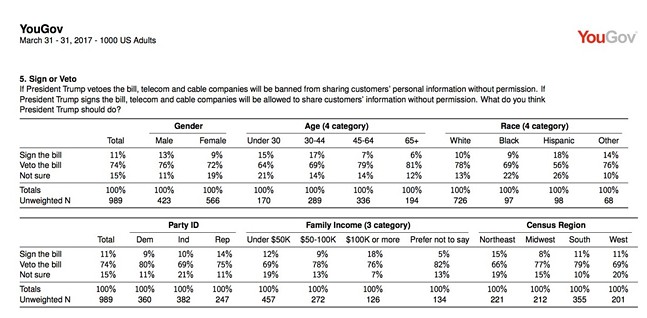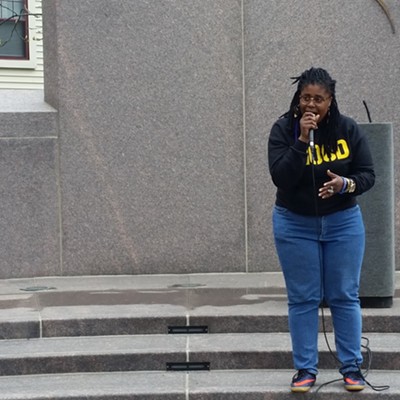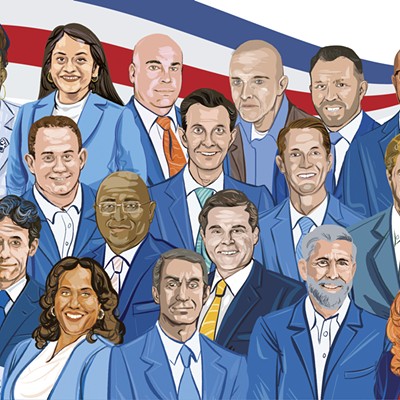Tuesday, April 4, 2017
How Southwestern Pennsylvania reps voted in rolling back internet rule meant to increase privacy
President Donald Trump made it official on April 3. The Obama-era rule meant to take effect by December 2017 which would have prohibited internet-service providers (ISPs), like Comcast and Verizon, from collecting browsing histories and selling them to advertisers without permission, was scrapped when Trump signed SJ 34 this week.
Internet users shouldn't freak out too much, though. No internet rules will change from how they currently operate. Despite sensational headlines circulating on the web, browsing histories can’t be purchased by individuals and then used for blackmail, etc. It's more likely that ISPs will continue to build huge data sets with users’ histories, and offer those data sets to advertisers for monetary reimbursement. But the roll-back of the rule does mean that internet users no longer have the option to surf the web without companies using their browsing history to sell them shit.

Companies like Google and Facebook have always — and would have continued to even under the now-axed rule — had the ability to mine users’ data to and sell it to advertisers. But for internet users who wished to avoid that, certain browsers, tools and programs offered more protection, by not saving cookies and discarding IP addresses. Now those options for the privacy-seeking users have been rolled back, since virtually everyone needs an ISP to access the internet.
Even though the ruling doesn’t change anything, the rollback of the Obama-era rule is still extremely unpopular. According to a YouGov poll taken on March 31, 74 percent of the Americans wanted Trump to veto the bill and only 11 percent wanted him to sign it. Even respondents who identified as Republicans hated the rollback. Only 14 percent of GOP respondents wanted the rule to go through and 75 percent wanted a veto.
SJ 34 passed by a 215-205 margin in the U.S. House and by a 50-48 margin in the U.S. Senate. That means if six reps in the House or two senators in the Senate had switched their votes, the bill would have died. Because the bill is so widely unpopular among the public, the Pennsylvania Democratic Party speculated that legislators who supported SJ 34 may have had some financial incentive to vote in favor, and published a list of the telecom industry’s contributions to their campaigns. However, Sen. Bob Casey, who voted against the change, also has received campaign money from telecom industry.
So who are those legislators that pushed through a very unpopular resolution? City Paper would love to write a list detailing all of the legislators in the House and Senate who voted for SJ 34, but that would be mind-numbingly long. Instead, CP provides a list of the Pennsylvania legislators in our coverage area and how they voted on the rollback of internet privacy.
Sen. Pat Toomey (R-Lehigh): YES
Toomey voted in favor of SJ 34 and his press secretary, Steve Kelly, in an email to CP, offered this explanation: “The actions taken by Congress do nothing to weaken longstanding federal and state privacy laws or investigatory powers. Rather, Congress rolled back a regulation passed by President Obama’s FCC in late 2016 which does not equally apply privacy rules across all online entities. Senator Toomey hopes that the FCC and the FTC will work together to develop uniform privacy requirements.”
Kelly also noted that the Federal Trade Commission and Federal Communications Commission still have the power to investigate unjust privacy practices, even though the Obama rule was rolled back.
Sen. Bob Casey (D-Scranton): NO
Casey voted against SJ 34 and sent this comment to CP by email: “Pennsylvanians have a reasonable expectation that their internet browsing history is private, which is why I voted against this resolution.”
U.S. Rep. Mike Doyle (D-Forest Hills): NO
Doyle voted against SJ 34 and, on March 28, spoke in front of Congress in opposition before the bill came to a vote. "Today we are waiting waist deep in the swamp," said Doyle. "The American people did not ask for this resolution. In fact, no company will even put its name behind this effort. ... No consumer has made an argument that this even makes sense. I challenge every member of this body, at your next town-hall meeting to have a show of hands of how many people thinks it's a good idea to allow your internet-service provider to sell their personal information without their permission."
Doyle also started a petition asking Trump to veto the bill. However, the petition only garnered 3,650 signatures of its 100,000 goal.
U.S. Rep. Mike Kelly (R-Butler): YES
Kelly voted in favor of SJ 34 and his office didn’t return a request for comment on why he voted for the bill, nor has Kelly made any public statement. Somewhat ironically, Kelly participated in an event with Google on March 13 in Sharon, Pa. meant to teach kids how to protect their privacy while using the internet.
U.S. Rep. Keith Rothfus (R-Sewickley): YES
Rothfus voted in favor of SJ 34 and in fairly typical Rothfus fashion, didn’t return a request for comment on why he supported the bill, nor offered any public statement.
U.S. Rep. Tim Murphy (R-Upper St. Clair): YES
Murphy voted in favor of SJ 34 and his press secretary, Carly Atchison, directed CP to Murphy’s public newsletter which says: “Murphy strongly supports online privacy rules to protect sensitive personal and consumer digital information. The Congressman voted in favor of the Email Privacy Act (H.R. 387) which passed the House earlier this year and sets the highest standard for government access to private internet communications. The Email Privacy Act protects emails, data and digital communications by requiring authorities to obtain a search warrant before gaining access to any such forms of communication.”
The newsletter also states the “net effect” of the rollback is “zero” and “Congress’ decision to kill the FCC’s proposed rules will leave in place data collection and use policies exactly as they are.”
However, according the YouGov poll, Americans appeared to want Congress and President Trump to make internet privacy better, not just leave it the way it is.
Internet users shouldn't freak out too much, though. No internet rules will change from how they currently operate. Despite sensational headlines circulating on the web, browsing histories can’t be purchased by individuals and then used for blackmail, etc. It's more likely that ISPs will continue to build huge data sets with users’ histories, and offer those data sets to advertisers for monetary reimbursement. But the roll-back of the rule does mean that internet users no longer have the option to surf the web without companies using their browsing history to sell them shit.

Image courtesy of today.yougov.com
Screenshot of poll asking how Americans feel about rollback of internet-privacy rule.
Companies like Google and Facebook have always — and would have continued to even under the now-axed rule — had the ability to mine users’ data to and sell it to advertisers. But for internet users who wished to avoid that, certain browsers, tools and programs offered more protection, by not saving cookies and discarding IP addresses. Now those options for the privacy-seeking users have been rolled back, since virtually everyone needs an ISP to access the internet.
Even though the ruling doesn’t change anything, the rollback of the Obama-era rule is still extremely unpopular. According to a YouGov poll taken on March 31, 74 percent of the Americans wanted Trump to veto the bill and only 11 percent wanted him to sign it. Even respondents who identified as Republicans hated the rollback. Only 14 percent of GOP respondents wanted the rule to go through and 75 percent wanted a veto.
SJ 34 passed by a 215-205 margin in the U.S. House and by a 50-48 margin in the U.S. Senate. That means if six reps in the House or two senators in the Senate had switched their votes, the bill would have died. Because the bill is so widely unpopular among the public, the Pennsylvania Democratic Party speculated that legislators who supported SJ 34 may have had some financial incentive to vote in favor, and published a list of the telecom industry’s contributions to their campaigns. However, Sen. Bob Casey, who voted against the change, also has received campaign money from telecom industry.
So who are those legislators that pushed through a very unpopular resolution? City Paper would love to write a list detailing all of the legislators in the House and Senate who voted for SJ 34, but that would be mind-numbingly long. Instead, CP provides a list of the Pennsylvania legislators in our coverage area and how they voted on the rollback of internet privacy.
Sen. Pat Toomey (R-Lehigh): YES
Toomey voted in favor of SJ 34 and his press secretary, Steve Kelly, in an email to CP, offered this explanation: “The actions taken by Congress do nothing to weaken longstanding federal and state privacy laws or investigatory powers. Rather, Congress rolled back a regulation passed by President Obama’s FCC in late 2016 which does not equally apply privacy rules across all online entities. Senator Toomey hopes that the FCC and the FTC will work together to develop uniform privacy requirements.”
Kelly also noted that the Federal Trade Commission and Federal Communications Commission still have the power to investigate unjust privacy practices, even though the Obama rule was rolled back.
Sen. Bob Casey (D-Scranton): NO
Casey voted against SJ 34 and sent this comment to CP by email: “Pennsylvanians have a reasonable expectation that their internet browsing history is private, which is why I voted against this resolution.”
U.S. Rep. Mike Doyle (D-Forest Hills): NO
I spoke against GOP bill to allow ISPs to collect and sell data about what you do online without your permission: https://t.co/3gzKGBskZy
— Mike Doyle (@USRepMikeDoyle) March 28, 2017
Doyle voted against SJ 34 and, on March 28, spoke in front of Congress in opposition before the bill came to a vote. "Today we are waiting waist deep in the swamp," said Doyle. "The American people did not ask for this resolution. In fact, no company will even put its name behind this effort. ... No consumer has made an argument that this even makes sense. I challenge every member of this body, at your next town-hall meeting to have a show of hands of how many people thinks it's a good idea to allow your internet-service provider to sell their personal information without their permission."
Doyle also started a petition asking Trump to veto the bill. However, the petition only garnered 3,650 signatures of its 100,000 goal.
U.S. Rep. Mike Kelly (R-Butler): YES
Kelly voted in favor of SJ 34 and his office didn’t return a request for comment on why he voted for the bill, nor has Kelly made any public statement. Somewhat ironically, Kelly participated in an event with Google on March 13 in Sharon, Pa. meant to teach kids how to protect their privacy while using the internet.
U.S. Rep. Keith Rothfus (R-Sewickley): YES
Rothfus voted in favor of SJ 34 and in fairly typical Rothfus fashion, didn’t return a request for comment on why he supported the bill, nor offered any public statement.
U.S. Rep. Tim Murphy (R-Upper St. Clair): YES
Murphy voted in favor of SJ 34 and his press secretary, Carly Atchison, directed CP to Murphy’s public newsletter which says: “Murphy strongly supports online privacy rules to protect sensitive personal and consumer digital information. The Congressman voted in favor of the Email Privacy Act (H.R. 387) which passed the House earlier this year and sets the highest standard for government access to private internet communications. The Email Privacy Act protects emails, data and digital communications by requiring authorities to obtain a search warrant before gaining access to any such forms of communication.”
The newsletter also states the “net effect” of the rollback is “zero” and “Congress’ decision to kill the FCC’s proposed rules will leave in place data collection and use policies exactly as they are.”
However, according the YouGov poll, Americans appeared to want Congress and President Trump to make internet privacy better, not just leave it the way it is.
Tags: Pat Toomey , Bob Casey , Mike Kelly , Keith Rothfus , Tim Murphy , Mike Doyle , SJ 34 , PolitiCrap , Image















